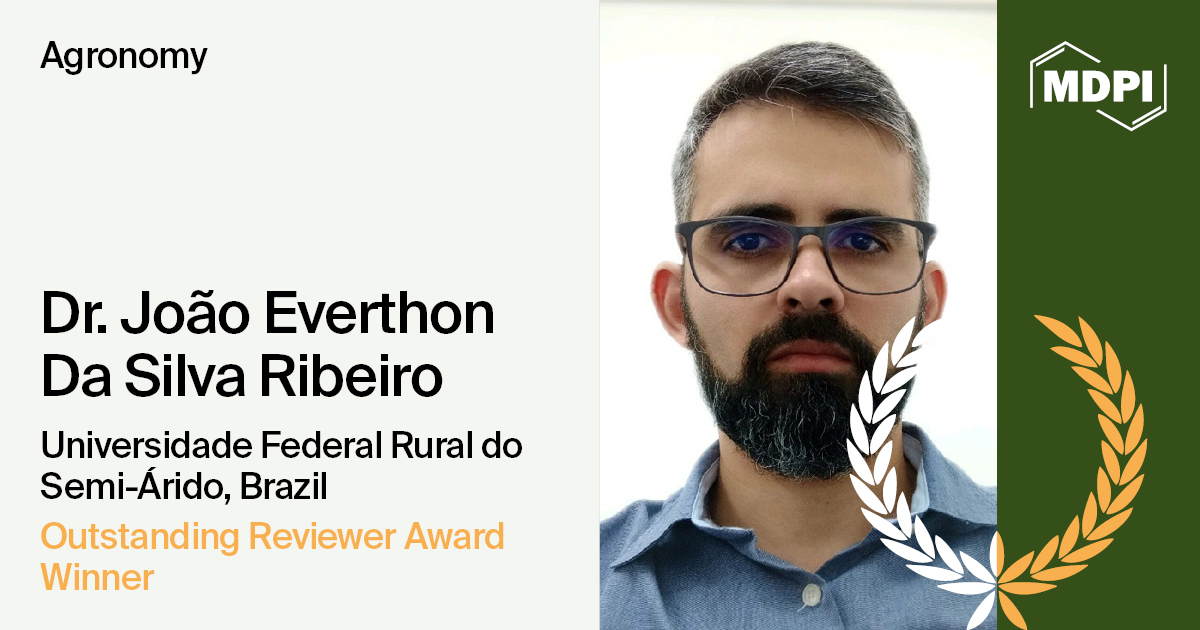
Interview with Dr. João Everthon Da Silva Ribeiro—Winner of the Agronomy Outstanding Reviewer Award
We are pleased to announce that Dr. João Everthon Da Silva Ribeiro is one of the winners of the Agronomy 2024 Outstanding Reviewer Award. The Award is presented annually to recognize reviewers who contribute their time to reviewing papers and display thoroughness, professionalism, and timeliness while doing so.
We are honored to have had the opportunity to interview Dr. João Everthon Da Silva Ribeiro, providing an opportunity to delve deeper into his research journey and his insights into being a reviewer.
1. Congratulations on being an Outstanding Reviewer for 2024! Could you briefly introduce yourself to our readers and share a bit about your research interests?It is an honor to receive this recognition. I'm João Everthon da Silva Ribeiro, a researcher in the field of plant physiology with a focus on abiotic stresses, especially salinity and water deficit. My main research interests involve the use of biostimulants, growth regulators, and other strategies to mitigate the adverse effects of challenging environments on crops. I have been working on projects with crops of economic importance for semi-arid regions.
2. What factors motivate you to be a reviewer for Agronomy, and what do you find most rewarding about the peer review process?Reviewing for Agronomy is a way to contribute to the quality and integrity of science actively. What motivates me is the possibility of collaborating with the advancement of knowledge and promoting rigor and clarity in scientific communication.
3. As a reviewer, how do you balance the encouragement for research innovation with the strict requirements for method reliability? Can you give an example?Innovation is essential for the progress of science, but it needs to go hand in hand with methodological rigor. I always analyze whether the proposed approach is well-founded, even if it is not conventional. A recent example was a study that used micronutrient nanoparticles in crops under salt stress. Although the proposal was innovative, I suggested adjustments to the experimental controls and statistical analyses to ensure the reproducibility of the results. Originality was maintained but with greater scientific robustness.
4. Based on your rich reviewing experience, could you please share some common problems that authors face?A recurring problem is the fragility of the method descriptions, which compromises reproducibility. In addition, many manuscripts lack critical discussion of the results, being limited to descriptions or superficial comparisons with the literature. The organization of the text and clarity of writing are also aspects that often require attention. I recommend that authors dedicate time to linguistic revision and seek technical support before submission.
5. What are the biggest challenges you face as a reviewer, and what are your tips for preparing a high-quality review report?The main challenge is time: reconciling professional demands with thorough and responsible reading. For a good report, I usually adopt a clear structure, dividing the comments into sections (e.g., Abstract, Introduction, Materials and Methods) and distinguishing between major and minor points. I also strive to be constructive, offering practical suggestions and providing relevant references. The goal is always to contribute to the improvement of the work rather than just pointing out flaws.
6. We hope that the Outstanding Reviewer Award will open new opportunities for you. How does an award like this help to support the career of a researcher such as yourself?This type of recognition strengthens our academic performance and values the often silent work of peer review. It enhances professional visibility and can open doors to collaborations and invitations to editorial committees. In addition, it serves as motivation to continue exercising this activity with responsibility and dedication.
7. Do you have any suggestions on how our journal could further support researchers and the academic community?Agronomy already stands out for its transparency and editorial agility. As a suggestion, training initiatives for authors and reviewers—such as webinars or mini-guides on good practices—would be welcome, especially for early-career researchers. I also believe that the promotion of special thematic issues can stimulate dialogue between research groups and strengthen emerging areas of research.
